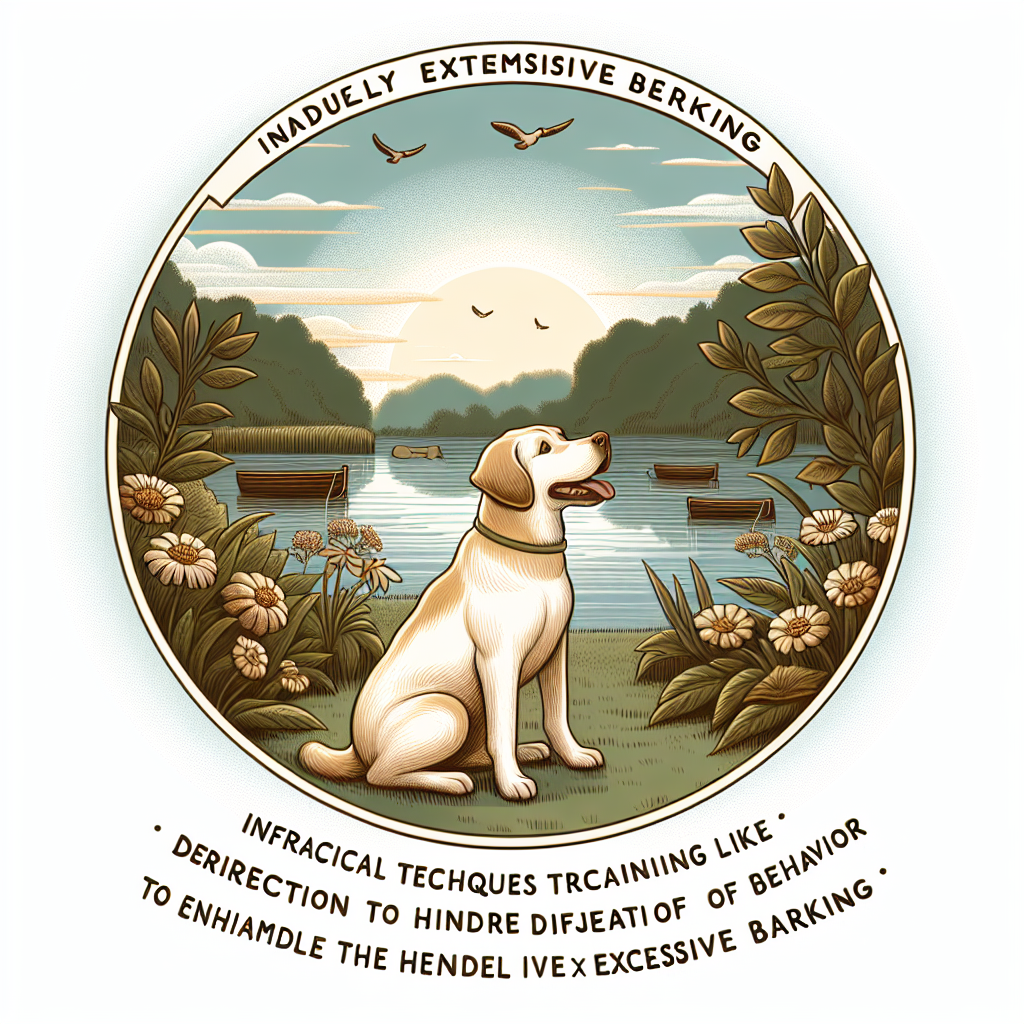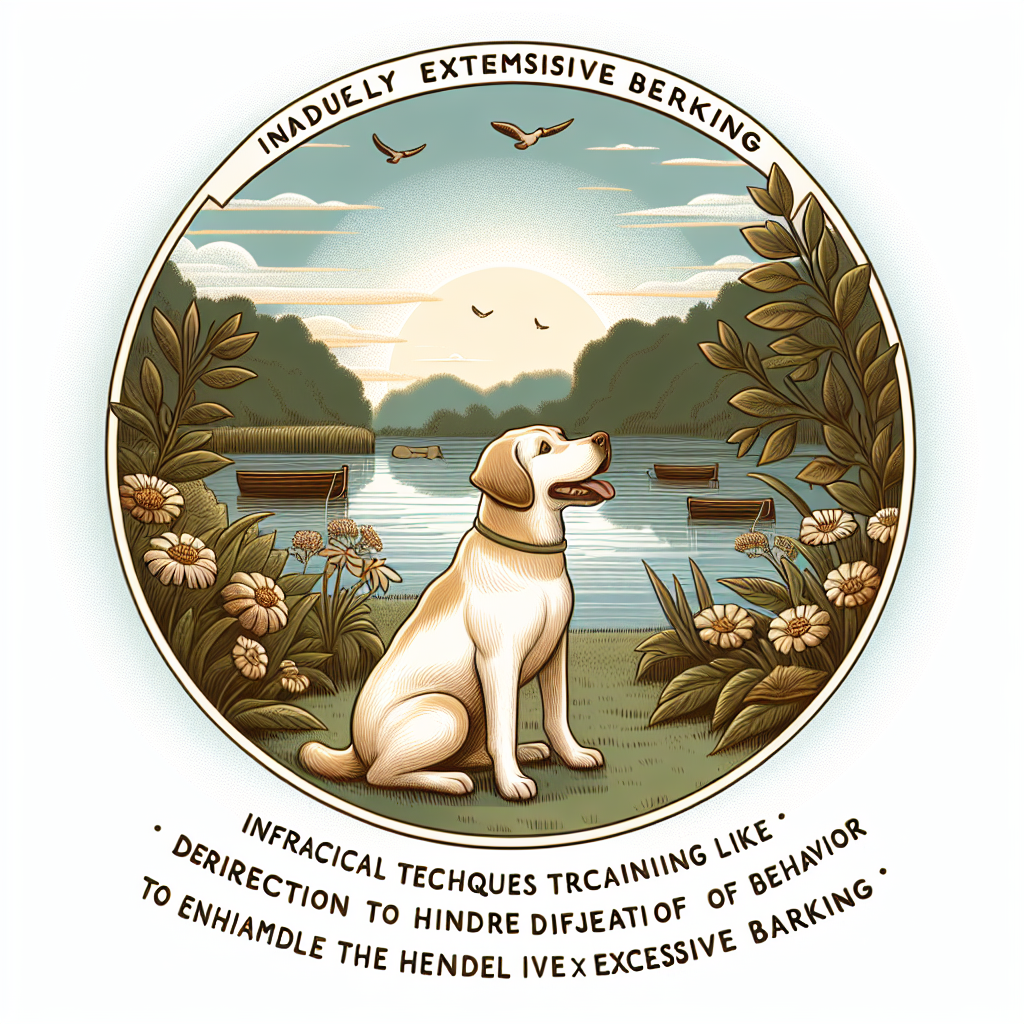If you’ve ever found yourself wondering how to put a stop to your furry friend’s incessant barking, you’ve come to the right place. Whether it’s the enthusiastic greetings or the territorial warnings, excessive barking can be a cause of frustration for both you and your neighbors. Luckily, with a little understanding and some simple training techniques, you can help your dog develop a healthier and quieter approach to communication. Say goodbye to the noise and hello to a more peaceful living environment for both you and your beloved pup.
Identify the Cause of Excessive Barking
Understanding Why Dogs Bark
Barking is a natural form of communication for dogs. It is their way of expressing various emotions such as excitement, fear, boredom, or anxiety. By understanding why dogs bark, you can better address the cause of excessive barking. Dogs may bark to alert you to something, seek attention, express frustration, or communicate with other dogs.
Differentiating Between Normal and Excessive Barking
Before we delve into addressing excessive barking, it’s important to differentiate normal barking from excessive barking. Normal barking occurs in response to specific triggers, such as the doorbell ringing or seeing a squirrel in the backyard. Excessive barking, on the other hand, is persistent, uncontrollable, and occurs for no apparent reason. It can become a nuisance and cause stress for both you and your furry companion.
Common Causes of Excessive Barking
There are several common causes of excessive barking that you should be aware of. These include separation anxiety, fear and anxiety, boredom, physical needs not being met, territorial behavior, or medical conditions. By identifying the underlying cause, you can tailor your approach to effectively address the excessive barking.
Addressing Physical Needs
Ensure Proper Exercise
One of the main reasons dogs bark excessively is due to a lack of physical exercise. Dogs need regular exercise to burn off excess energy and reduce their urge to bark. Make sure to provide your canine friend with daily walks, playtime, and engaging activities to tire them out. A tired dog is a happy dog, and a tired dog is less likely to engage in excessive barking.
Provide Mental Stimulation
In addition to physical exercise, mental stimulation is crucial for preventing excessive barking. Boredom can lead to frustration, which may manifest as excessive barking. Engage your dog’s mind with puzzle toys, interactive games, and training sessions. This will not only tire them out mentally but also provide a constructive outlet for their energy, reducing the likelihood of excessive barking.

Training and Behavior Modification
Positive Reinforcement
Positive reinforcement is a highly effective method for training dogs and modifying their behavior. When your dog remains quiet and doesn’t bark excessively, reward them with treats, praise, or affection. This positive association will encourage your dog to exhibit calmer behavior and decrease their tendency to bark excessively.
Teaching the ‘Quiet’ Command
Teaching your dog the ‘quiet’ command can be immensely helpful in reducing excessive barking. Start by using a trigger that typically causes your dog to bark, such as knocking on the door. When your dog barks, say “quiet” and wait for them to stop. Once they do, reward them with a treat and praise. With consistent practice and reinforcement, your dog will associate the command with stopping barking and respond accordingly.
Desensitization and Counterconditioning
If your dog barks excessively in response to certain triggers, such as other dogs or loud noises, desensitization and counterconditioning can help. Gradually expose your dog to the trigger at a distance and reward them for remaining calm. Over time, gradually decrease the distance between your dog and the trigger while ensuring they remain calm. This technique helps them associate the trigger with positive experiences and reduces their tendency to bark excessively.
Seeking Professional Help
If you’re struggling to address your dog’s excessive barking on your own, it may be beneficial to seek professional help. A certified dog trainer or behaviorist can assess your unique situation, provide personalized guidance, and develop a training plan tailored to your dog’s specific needs. They can offer valuable insights and techniques that will maximize your chances of success in curbing excessive barking.
Creating a Calm Environment
Establish Consistent Routine
Dogs thrive on routine, and creating a consistent daily schedule can contribute to a calmer environment. Feed your dog at the same time each day, establish regular exercise and playtime routines, and set a consistent bedtime. Predictability and structure help dogs feel secure and reduce stress, ultimately decreasing their likelihood of engaging in excessive barking.
Reduce Triggers
Identify and minimize the triggers that cause your dog to bark excessively. If your dog barks at passersby through a window, consider closing the blinds or moving them to a different area of the house. If your dog barks at noises during the night, use a white noise machine or soothing music to mask the sounds. By reducing triggers, you can create a more peaceful environment for your dog and decrease their urge to bark excessively.
Use Background Noise or White Noise
Creating a background noise or using white noise can help drown out noises that may trigger your dog’s excessive barking. Whether it’s a fan, a radio playing soft music, or a dedicated white noise machine, providing a consistent noise level can create a calming atmosphere for your furry friend. This steady background noise can help mask sudden sounds and reduce their reactivity.

Using Tools and Techniques
Citronella Collars
Citronella collars are one option to consider when addressing excessive barking. These collars release a burst of citronella spray when your dog barks, creating an unpleasant scent for them. The association between the unpleasant scent and barking can deter your dog from engaging in excessive barking. However, it’s important to use such tools in conjunction with training and positive reinforcement for the best results.
Ultrasonic Devices
Ultrasonic devices emit a high-frequency sound that is unpleasant to dogs but inaudible to humans. These devices can be used to interrupt excessive barking and redirect your dog’s attention. Be cautious when using ultrasonic devices, as their effectiveness varies depending on the individual dog. It’s crucial to use them responsibly and alongside proper training techniques.
Training Aids
Various training aids are available to assist in addressing excessive barking. Bark control collars emit a mild static correction when your dog barks excessively. However, it’s essential to choose a collar that is humane, safe, and appropriate for your dog’s size and breed. Other training aids include citronella or ultrasonic bark deterrent devices, which work by interrupting and redirecting your dog’s excessive barking.
Managing Separation Anxiety
Gradual Desensitization
Separation anxiety is a common cause of excessive barking when dogs are left alone. Gradual desensitization involves gradually increasing the time that your dog spends alone, starting with short intervals and gradually extending the duration. By slowly acclimating your dog to longer periods of alone time, you can help alleviate their separation anxiety and reduce their excessive barking.
Leaving Cue and Distraction
Establishing a leaving cue, such as picking up your keys or putting on your coat, can help your dog associate your departure with positive experiences. Pair the leaving cue with a reward, such as a treat-stuffed toy or a frozen Kong. Additionally, providing engaging distractions, such as puzzle toys or long-lasting chews, can keep your dog occupied and minimize their anxiety during periods of separation.
Seeking Professional Guidance
If your dog’s separation anxiety and excessive barking persist despite your best efforts, it may be wise to consult with a professional. A veterinarian or an animal behaviorist can provide expert guidance based on your dog’s specific needs. They may recommend behavior modification techniques, medication, or a combination of approaches to help manage your dog’s separation anxiety and reduce their excessive barking.

Addressing Fear and Anxiety
Identify the Triggers
Fear and anxiety can lead to excessive barking, so it’s important to identify the specific triggers that cause your dog’s fearful or anxious response. These triggers may include thunderstorms, fireworks, or unfamiliar situations. By pinpointing the triggers, you can implement targeted techniques to help your dog feel more secure and reduce their tendency to bark excessively.
Implement Desensitization Techniques
Desensitization involves gradually exposing your dog to the trigger at a low intensity and rewarding calm behavior. For example, if your dog is fearful of thunderstorms, play recorded thunderstorm sounds at a very low volume while engaging in a rewarding activity with your dog. Over time, incrementally increase the volume and continue rewarding calm behavior. This desensitization process can help your dog overcome their fear and reduce excessive barking.
Consider Medication
In severe cases of fear and anxiety, medication prescribed by a veterinarian may be necessary. Anti-anxiety medications can help your dog remain calm and reduce their excessive barking during particularly stressful situations. It’s important to work closely with your veterinarian to determine the appropriate medication and dosage for your dog.
Avoiding Reinforcement of Barking
Ignore Attention-Seeking Barking
If your dog engages in attention-seeking barking, it’s important to avoid reinforcing this behavior. Be disciplined and avoid giving attention, whether positive or negative, when your dog barks excessively for attention. Wait for your dog to stop barking before providing any desired attention or rewards. Consistency is key in breaking this habit and teaching your dog that quiet behavior is more rewarding.
Avoid Yelling or Punishment
Yelling at or punishing your dog for excessive barking can backfire and intensify their anxiety or fear. Punishment-based methods can damage the trust between you and your furry friend and worsen their behavioral issues. Instead, focus on positive reinforcement, training, and behavior modification techniques to address excessive barking in a humane and effective manner.

Ensuring Physical Health
Regular Veterinary Check-ups
Excessive barking can sometimes be a symptom of an underlying medical condition. Ensure that your dog receives regular veterinary check-ups to rule out any health issues that may be causing or contributing to their excessive barking. Your veterinarian will perform a thorough evaluation and provide appropriate treatment if necessary.
Medical Conditions that Cause Excessive Barking
Some medical conditions, such as pain, hearing loss, or cognitive dysfunction, can lead to excessive barking. If your dog’s excessive barking persists or is accompanied by other concerning symptoms, consult with your veterinarian. They can conduct further diagnostic tests and recommend appropriate treatment options to address the specific medical condition causing the excessive barking.
Preventing Boredom
Provide Interactive Toys
Boredom is a common cause of excessive barking, especially in highly intelligent and energetic dog breeds. Provide your dog with interactive toys that can occupy their attention and challenge their problem-solving skills. Puzzle toys, treat-dispensing toys, and interactive feeders are great options to keep your dog mentally engaged and prevent boredom-related excessive barking.
Rotate Toys and Activities
To keep your dog’s interest piqued, routinely rotate their toys and activities. Introduce new toys and games regularly to provide novelty and prevent monotony. This variety will keep your dog engaged and mentally stimulated, reducing their likelihood of engaging in excessive barking due to boredom.
Enroll in Doggy Daycare or Playgroups
If your schedule allows, enrolling your dog in doggy daycare or regular playgroups can provide them with necessary socialization and mental stimulation. These environments offer opportunities for your dog to interact with other dogs, engage in supervised play, and expend their energy. A tired and socially fulfilled dog is less likely to engage in excessive barking caused by boredom.
By addressing the root causes of excessive barking, providing appropriate mental and physical stimulation, training your dog, and creating a calm and supportive environment, you can effectively minimize and manage your dog’s excessive barking. Remember, patience, consistency, and positive reinforcement are key in helping your dog develop better barking habits and leading a more enjoyable and peaceful life for both of you.





